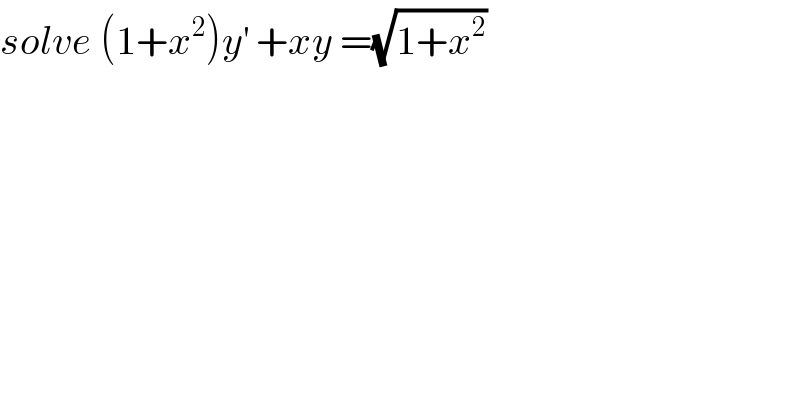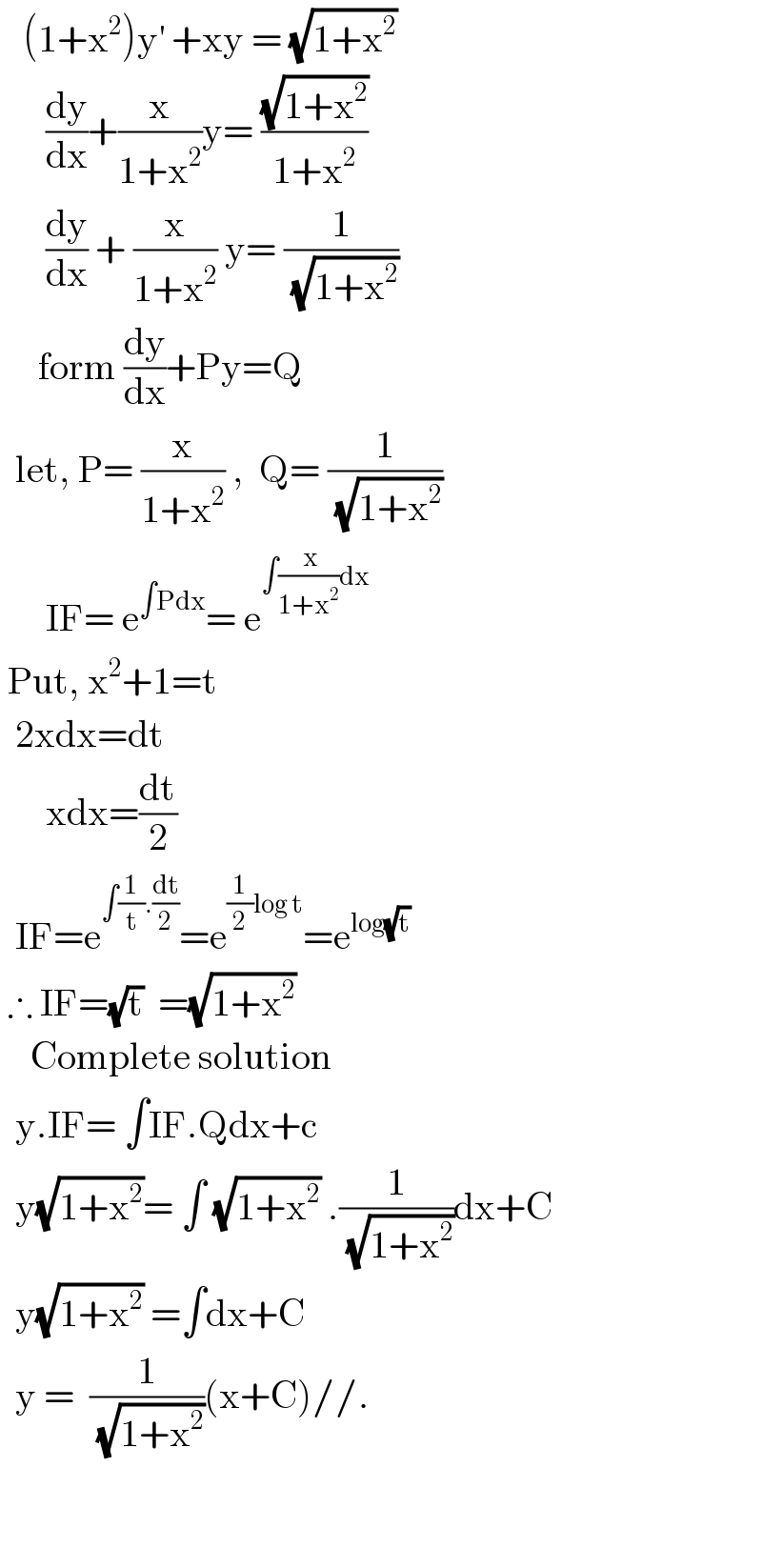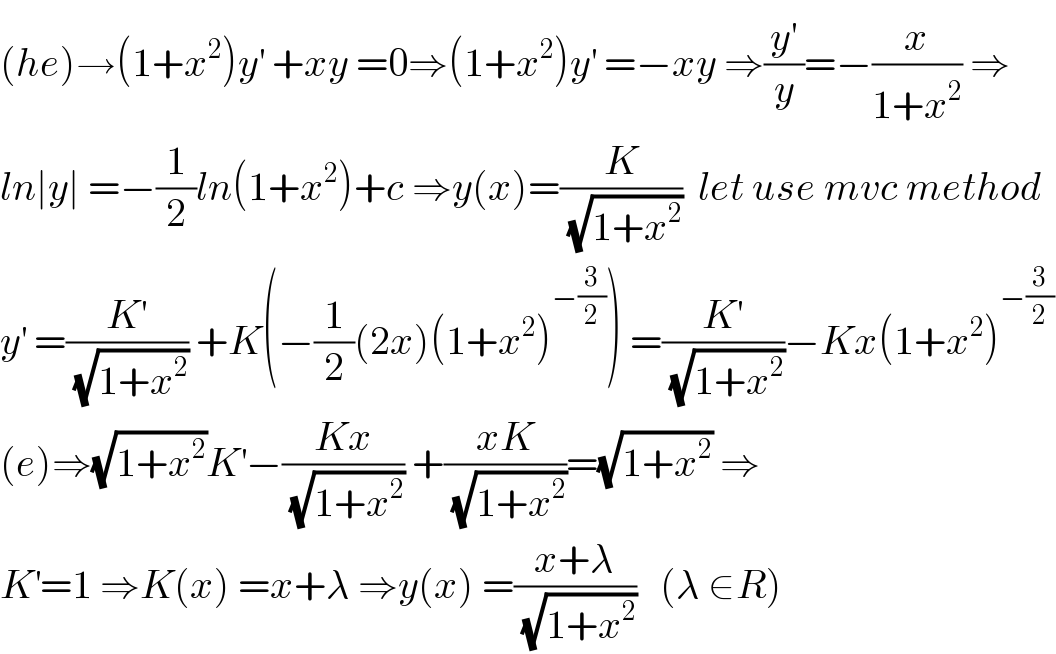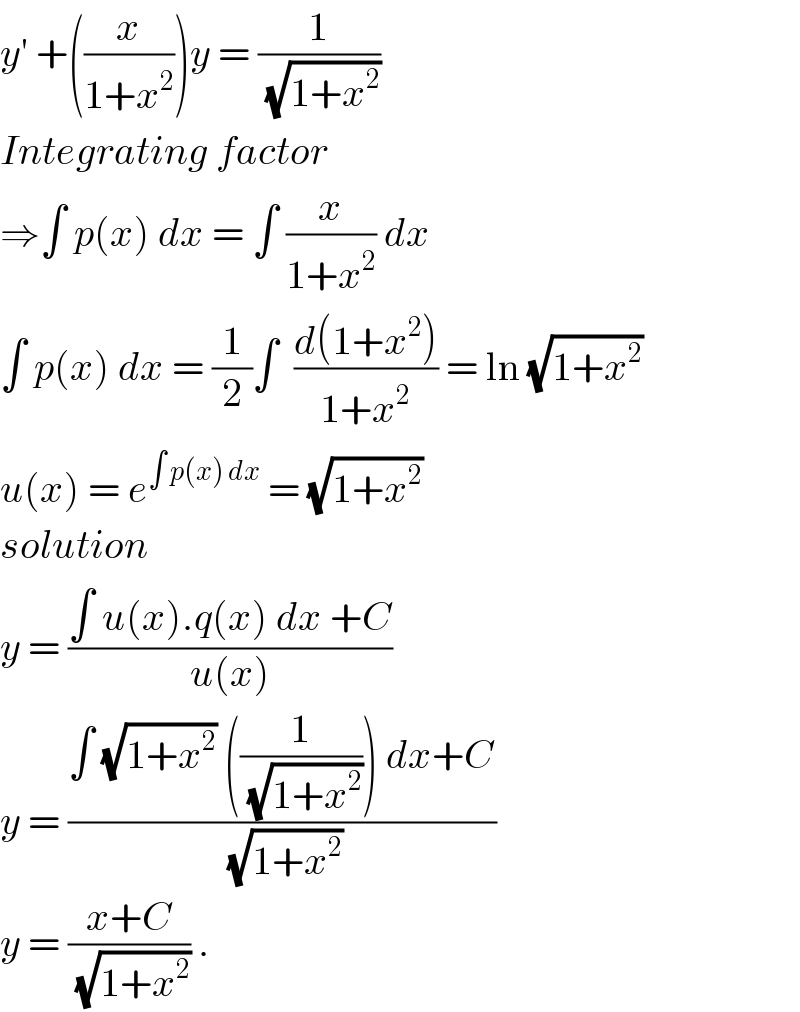
Previous in Relation and Functions Next in Relation and Functions
Question Number 90963 by abdomathmax last updated on 27/Apr/20

$${solve}\:\left(\mathrm{1}+{x}^{\mathrm{2}} \right){y}^{'} \:+{xy}\:=\sqrt{\mathrm{1}+{x}^{\mathrm{2}} } \\ $$
Commented by niroj last updated on 27/Apr/20

$$\:\:\:\left(\mathrm{1}+\mathrm{x}^{\mathrm{2}} \right)\mathrm{y}^{'} \:+\mathrm{xy}\:=\:\sqrt{\mathrm{1}+\mathrm{x}^{\mathrm{2}} } \\ $$$$\:\:\:\:\:\:\frac{\mathrm{dy}}{\mathrm{dx}}+\frac{\mathrm{x}}{\mathrm{1}+\mathrm{x}^{\mathrm{2}} }\mathrm{y}=\:\frac{\sqrt{\mathrm{1}+\mathrm{x}^{\mathrm{2}} }}{\mathrm{1}+\mathrm{x}^{\mathrm{2}} } \\ $$$$\:\:\:\:\:\:\frac{\mathrm{dy}}{\mathrm{dx}}\:+\:\frac{\mathrm{x}}{\mathrm{1}+\mathrm{x}^{\mathrm{2}} }\:\mathrm{y}=\:\frac{\mathrm{1}}{\sqrt{\mathrm{1}+\mathrm{x}^{\mathrm{2}} }} \\ $$$$\:\:\:\:\:\mathrm{form}\:\frac{\mathrm{dy}}{\mathrm{dx}}+\mathrm{Py}=\mathrm{Q} \\ $$$$\:\:\mathrm{let},\:\mathrm{P}=\:\frac{\mathrm{x}}{\mathrm{1}+\mathrm{x}^{\mathrm{2}} }\:,\:\:\mathrm{Q}=\:\frac{\mathrm{1}}{\sqrt{\mathrm{1}+\mathrm{x}^{\mathrm{2}} }} \\ $$$$\:\:\:\:\:\:\mathrm{IF}=\:\mathrm{e}^{\int\mathrm{Pdx}} =\:\mathrm{e}^{\int\frac{\:\mathrm{x}}{\mathrm{1}+\mathrm{x}^{\mathrm{2}} }\mathrm{dx}} \\ $$$$\:\mathrm{Put},\:\mathrm{x}^{\mathrm{2}} +\mathrm{1}=\mathrm{t} \\ $$$$\:\:\mathrm{2xdx}=\mathrm{dt} \\ $$$$\:\:\:\:\:\:\mathrm{xdx}=\frac{\mathrm{dt}}{\mathrm{2}} \\ $$$$\:\:\mathrm{IF}=\mathrm{e}^{\int\frac{\mathrm{1}}{\mathrm{t}}.\frac{\mathrm{dt}}{\mathrm{2}}} =\mathrm{e}^{\frac{\mathrm{1}}{\mathrm{2}}\mathrm{log}\:\mathrm{t}} =\mathrm{e}^{\mathrm{log}\sqrt{\mathrm{t}}} \\ $$$$\:\therefore\:\mathrm{IF}=\sqrt{\mathrm{t}}\:\:=\sqrt{\mathrm{1}+\mathrm{x}^{\mathrm{2}} } \\ $$$$\:\:\:\:\mathrm{Complete}\:\mathrm{solution} \\ $$$$\:\:\mathrm{y}.\mathrm{IF}=\:\int\mathrm{IF}.\mathrm{Qdx}+\mathrm{c} \\ $$$$\:\:\mathrm{y}\sqrt{\mathrm{1}+\mathrm{x}^{\mathrm{2}} }=\:\int\:\sqrt{\mathrm{1}+\mathrm{x}^{\mathrm{2}} }\:.\frac{\mathrm{1}}{\sqrt{\mathrm{1}+\mathrm{x}^{\mathrm{2}} }}\mathrm{dx}+\mathrm{C} \\ $$$$\:\:\mathrm{y}\sqrt{\mathrm{1}+\mathrm{x}^{\mathrm{2}} }\:=\int\mathrm{dx}+\mathrm{C} \\ $$$$\:\:\mathrm{y}\:=\:\:\frac{\mathrm{1}}{\sqrt{\mathrm{1}+\mathrm{x}^{\mathrm{2}} }}\left(\mathrm{x}+\mathrm{C}\right)//. \\ $$$$ \\ $$$$ \\ $$
Commented by mathmax by abdo last updated on 27/Apr/20

$$\left({he}\right)\rightarrow\left(\mathrm{1}+{x}^{\mathrm{2}} \right){y}^{'} \:+{xy}\:=\mathrm{0}\Rightarrow\left(\mathrm{1}+{x}^{\mathrm{2}} \right){y}^{'} \:=−{xy}\:\Rightarrow\frac{{y}^{'} }{{y}}=−\frac{{x}}{\mathrm{1}+{x}^{\mathrm{2}} }\:\Rightarrow \\ $$$${ln}\mid{y}\mid\:=−\frac{\mathrm{1}}{\mathrm{2}}{ln}\left(\mathrm{1}+{x}^{\mathrm{2}} \right)+{c}\:\Rightarrow{y}\left({x}\right)=\frac{{K}}{\sqrt{\mathrm{1}+{x}^{\mathrm{2}} }}\:\:{let}\:{use}\:{mvc}\:{method} \\ $$$${y}^{'} \:=\frac{{K}^{'} }{\sqrt{\mathrm{1}+{x}^{\mathrm{2}} }}\:+{K}\left(−\frac{\mathrm{1}}{\mathrm{2}}\left(\mathrm{2}{x}\right)\left(\mathrm{1}+{x}^{\mathrm{2}} \right)^{−\frac{\mathrm{3}}{\mathrm{2}}} \right)\:=\frac{{K}^{'} }{\sqrt{\mathrm{1}+{x}^{\mathrm{2}} }}−{Kx}\left(\mathrm{1}+{x}^{\mathrm{2}} \right)^{−\frac{\mathrm{3}}{\mathrm{2}}} \\ $$$$\left({e}\right)\Rightarrow\sqrt{\mathrm{1}+{x}^{\mathrm{2}} }{K}^{'} −\frac{{Kx}}{\sqrt{\mathrm{1}+{x}^{\mathrm{2}} }}\:+\frac{{xK}}{\sqrt{\mathrm{1}+{x}^{\mathrm{2}} }}=\sqrt{\mathrm{1}+{x}^{\mathrm{2}} }\:\Rightarrow \\ $$$${K}^{'} =\mathrm{1}\:\Rightarrow{K}\left({x}\right)\:={x}+\lambda\:\Rightarrow{y}\left({x}\right)\:=\frac{{x}+\lambda}{\sqrt{\mathrm{1}+{x}^{\mathrm{2}} }}\:\:\:\left(\lambda\:\in{R}\right) \\ $$
Answered by john santu last updated on 27/Apr/20

$${y}'\:+\left(\frac{{x}}{\mathrm{1}+{x}^{\mathrm{2}} }\right){y}\:=\:\frac{\mathrm{1}}{\sqrt{\mathrm{1}+{x}^{\mathrm{2}} }} \\ $$$${Integrating}\:{factor} \\ $$$$\Rightarrow\int\:{p}\left({x}\right)\:{dx}\:=\:\int\:\frac{{x}}{\mathrm{1}+{x}^{\mathrm{2}} }\:{dx}\: \\ $$$$\int\:{p}\left({x}\right)\:{dx}\:=\:\frac{\mathrm{1}}{\mathrm{2}}\int\:\:\frac{{d}\left(\mathrm{1}+{x}^{\mathrm{2}} \right)}{\mathrm{1}+{x}^{\mathrm{2}} }\:=\:\mathrm{ln}\:\sqrt{\mathrm{1}+{x}^{\mathrm{2}} } \\ $$$${u}\left({x}\right)\:=\:{e}^{\int\:{p}\left({x}\right)\:{dx}} \:=\:\sqrt{\mathrm{1}+{x}^{\mathrm{2}} } \\ $$$${solution}\: \\ $$$${y}\:=\:\frac{\int\:{u}\left({x}\right).{q}\left({x}\right)\:{dx}\:+{C}}{{u}\left({x}\right)} \\ $$$${y}\:=\:\frac{\int\:\sqrt{\mathrm{1}+{x}^{\mathrm{2}} }\:\left(\frac{\mathrm{1}}{\sqrt{\mathrm{1}+{x}^{\mathrm{2}} }}\right)\:{dx}+{C}}{\sqrt{\mathrm{1}+{x}^{\mathrm{2}} }} \\ $$$${y}\:=\:\frac{{x}+{C}}{\sqrt{\mathrm{1}+{x}^{\mathrm{2}} }}\:.\: \\ $$
